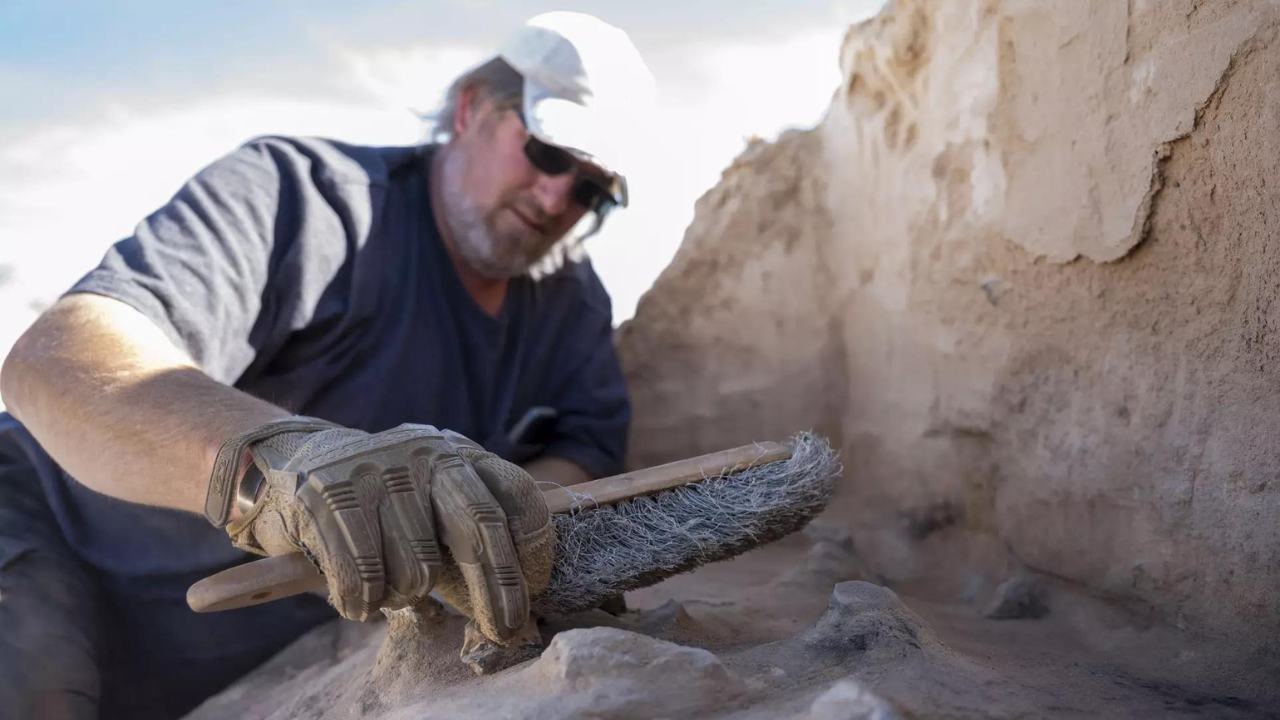Matthew Cuba, the 49th CES cultural resource manager, explained that the site was buried under sands blown from the nearby White Sands National Park, preserving its archaeological integrity. “The formation of the white sand dunes inadvertently buried the site, with windblown silt protecting the delicate archaeological remains,” Cuba said, noting the importance of the discovery in shedding light on the area’s history and its early inhabitants.
Among the finds at the Gomolak Overlook are the remains of a hearth with charcoal stains, evidence of the early settlers’ reliance on fire. Approximately 70 items were discovered, including flake stones and a rare early ground stone, which offer clues about past human activities. “We also uncovered a series of hearths, or community campsites, with remnants of mesquite charcoal, which is a tremendous find in and of itself,” added Cuba.
Scott Dorton, the 49th CES environmental chief, emphasized the commitment to preserving the site in accordance with the National Historic Preservation Act. This ensures that the site’s integrity is maintained while still allowing for the progression of the test track project at the base. Dorton also highlighted the Department of Defense’s role in protecting vast tracts of land that house many archaeological resources.
This discovery not only marks a pivotal moment in understanding early human adaptation and environmental changes but also underscores the importance of preserving such historical sites for future generations.
function loadGtagEvents(isGoogleCampaignActive) { if (!isGoogleCampaignActive) { return; } var id = document.getElementById('toi-plus-google-campaign'); if (id) { return; } (function(f, b, e, v, n, t, s) { t = b.createElement(e); t.async = !0; t.defer = !0; t.src = v; t.id = 'toi-plus-google-campaign'; s = b.getElementsByTagName(e)[0]; s.parentNode.insertBefore(t, s); })(f, b, e, 'https://www.googletagmanager.com/gtag/js?id=AW-877820074', n, t, s); };
function loadSurvicateJs(allowedSurvicateSections = []){ const section = window.location.pathname.split('/')[1] const isHomePageAllowed = window.location.pathname === '/' && allowedSurvicateSections.includes('homepage')
if(allowedSurvicateSections.includes(section) || isHomePageAllowed){ (function(w) { var s = document.createElement('script'); s.src="https://survey.survicate.com/workspaces/0be6ae9845d14a7c8ff08a7a00bd9b21/web_surveys.js"; s.async = true; var e = document.getElementsByTagName('script')[0]; e.parentNode.insertBefore(s, e); })(window); }
}
window.TimesApps = window.TimesApps || {}; var TimesApps = window.TimesApps; TimesApps.toiPlusEvents = function(config) { var isConfigAvailable = "toiplus_site_settings" in f && "isFBCampaignActive" in f.toiplus_site_settings && "isGoogleCampaignActive" in f.toiplus_site_settings; var isPrimeUser = window.isPrime; if (isConfigAvailable && !isPrimeUser) { loadGtagEvents(f.toiplus_site_settings.isGoogleCampaignActive); loadFBEvents(f.toiplus_site_settings.isFBCampaignActive); loadSurvicateJs(f.toiplus_site_settings.allowedSurvicateSections); } else { var JarvisUrl="https://vsp1jarvispvt.indiatimes.com/v1/feeds/toi_plus/site_settings/643526e21443833f0c454615?db_env=published"; window.getFromClient(JarvisUrl, function(config){ if (config) { loadGtagEvents(config?.isGoogleCampaignActive); loadFBEvents(config?.isFBCampaignActive); loadSurvicateJs(config?.allowedSurvicateSections); } }) } }; })( window, document, 'script', );



